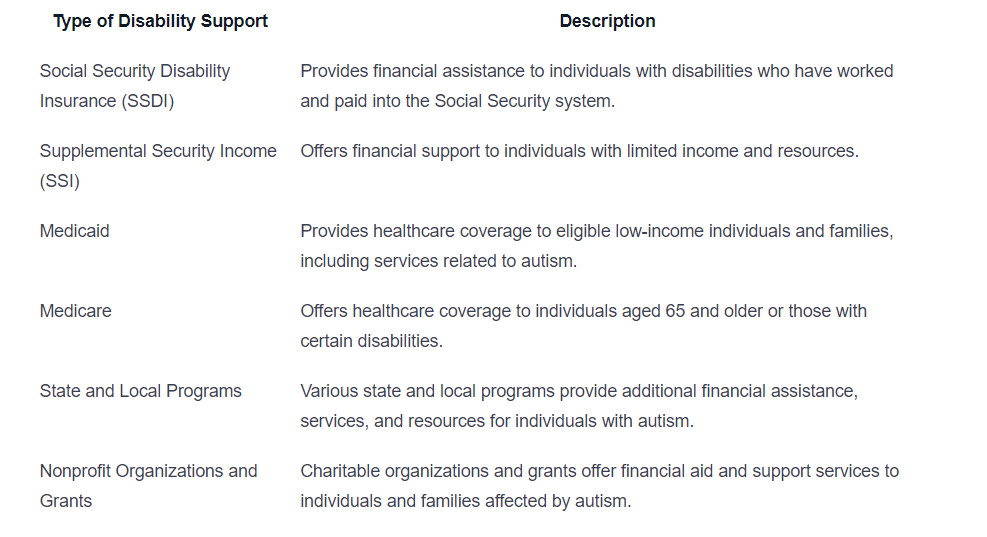How Much is a Disability Check for Autism?
Discover the amount you can receive from a disability check for autism. Unveiling the financial support available for individuals with autism.

Understanding Disability Support for Autism
When it comes to autism, accessing disability support is essential for individuals and their families. Disability support provides financial assistance and resources to help manage the challenges associated with autism. Understanding the importance of disability support and the types available is crucial for those seeking assistance.

The Importance of Disability Support
Disability support plays a significant role in the lives of individuals with autism and their families. It provides financial aid to help cover the costs of necessary services, therapies, and support systems. Additionally, disability support offers a sense of security and stability, ensuring that individuals with autism have access to the resources they need to thrive.
By having access to disability support, individuals with autism can receive the necessary accommodations and interventions required for their development and well-being. This support helps to alleviate financial burdens and ensures that individuals with autism can access the care and assistance they need to reach their full potential.
Types of Disability Support Available
There are several types of disability support available for individuals with autism. These programs aim to provide financial assistance, healthcare coverage, and additional resources to support individuals and their families on their autism journey. Some of the common types of disability support include:

Understanding the different types of disability support available can help individuals and families explore their options and find the assistance that best suits their needs. It's important to research and evaluate the eligibility criteria, benefits, and limitations of each program to determine the most suitable support for their specific circumstances.
By accessing disability support, individuals with autism can receive the financial aid and resources necessary to enhance their quality of life and maximize their potential. It's crucial to navigate the application process with care and seek professional guidance when needed to ensure a successful application.
Social Security Disability Insurance (SSDI)
For individuals with autism, Social Security Disability Insurance (SSDI) can provide crucial financial support. This program is designed to assist individuals who are unable to work due to a disability. In this section, we will explore the eligibility criteria for SSDI and how the amount of benefits is determined.
Eligibility for SSDI
To qualify for SSDI benefits, individuals with autism must meet certain criteria:
- Work Credits: Applicants must have earned enough work credits through their employment history. The number of work credits required depends on the individual's age at the time they became disabled. Generally, a minimum of 20 work credits earned in the past 10 years is required.
- Severity of Disability: The Social Security Administration (SSA) evaluates the severity of the disability by assessing its impact on the individual's ability to work. In the case of autism, the SSA considers factors such as social interaction limitations, communication difficulties, and restricted and repetitive behaviors.
- Duration of Disability: The disability must be expected to last for at least 12 months or result in death.
It's important to note that each case is evaluated individually, and meeting these criteria does not guarantee approval for SSDI benefits.
Determining the Amount of SSDI Benefits
The amount of SSDI benefits for individuals with autism is calculated based on their average lifetime earnings. The SSA uses a formula that takes into account the individual's earnings history and the Social Security taxes they have paid.
The SSA applies a complex calculation, known as the Primary Insurance Amount (PIA), to determine the monthly benefit amount. This calculation considers the individual's average indexed monthly earnings over their working years.
The specific benefit amount can vary widely depending on individual circumstances. It's worth noting that SSDI benefits are not means-tested, meaning they are not affected by other sources of income or assets.
To get an estimate of your potential SSDI benefit amount, you can refer to the SSA's online calculators or contact the SSA directly for personalized assistance.
Understanding the eligibility requirements and the factors that determine the amount of SSDI benefits is crucial for individuals with autism and their families. By navigating the application process and meeting the necessary criteria, individuals with autism can access the financial support they need to enhance their quality of life.
Supplemental Security Income (SSI)
Supplemental Security Income (SSI) is a federal program designed to provide financial assistance to individuals with disabilities, including those with autism. SSI benefits are intended to help cover the cost of basic needs such as food, shelter, and clothing. In this section, we will discuss the eligibility criteria for SSI and how the benefits are calculated.
Eligibility for SSI
To be eligible for SSI benefits, individuals must meet certain criteria, including:
- Having a qualifying disability: The individual must have a physical or mental impairment that significantly limits their ability to work and is expected to last for at least 12 months or result in death.
- Meeting the income requirements: SSI has strict income limits, and the individual's income and resources must fall below these limits to qualify for benefits.
- Residency and citizenship: The applicant must be a U.S. citizen or a qualified noncitizen and reside in the United States.
It's important to note that the eligibility criteria for SSI can vary depending on factors such as age, living arrangements, and income sources. Consulting with a Social Security representative or visiting the official Social Security Administration website can provide more specific information regarding eligibility.
Calculating SSI Benefits
The amount of SSI benefits an individual can receive is determined by several factors, including income, resources, and living arrangements. The Social Security Administration uses a formula to calculate the monthly benefit amount.
The federal benefit rate (FBR), which is set by the government, serves as the base amount for SSI benefits. However, this amount can be adjusted based on the individual's countable income and resources.
Countable income includes wages, Social Security benefits, and other forms of income that are considered when determining eligibility. Countable resources refer to the assets an individual owns, such as cash, bank accounts, and property.
The SSI benefits are calculated by subtracting the countable income from the federal benefit rate. If the individual has countable income or resources above the established limits, their SSI benefits may be reduced or even eliminated.
It's important to keep in mind that SSI benefits may also be affected by other factors, such as living arrangements and financial support provided by family members.
The exact calculation of SSI benefits can be complex, and it's recommended to seek assistance from a Social Security representative to ensure accurate information and guidance specific to individual circumstances.
The SSI program can provide valuable financial support to individuals with autism, helping them meet their basic needs. Understanding the eligibility criteria and how benefits are calculated is essential for those seeking SSI assistance.
Medicaid and Medicare
When it comes to seeking financial assistance for individuals with autism, Medicaid and Medicare are two important programs to consider. These programs provide coverage for medical expenses and services that can significantly support individuals with autism and their families.
Medicaid Coverage for Autism
Medicaid is a joint federal and state program that provides healthcare coverage to low-income individuals and families. The coverage for autism under Medicaid varies from state to state, but there are common services that are often covered. These may include:
- Diagnostic evaluations
- Behavioral health services
- Speech and language therapy
- Occupational therapy
- Physical therapy
- Prescription medications
To determine the specific coverage available in your state, it is recommended to contact your local Medicaid office or visit their website. They can provide detailed information about the services covered, eligibility requirements, and the application process.
Medicare Coverage for Autism
Medicare is a federal health insurance program primarily designed for individuals who are 65 years or older. While Medicare does not specifically cover autism-related services for adults, it may cover certain medical services related to autism. These services may include:
- Doctor visits
- Hospital stays
- Prescription medications
- Some diagnostic tests
It's important to note that Medicare coverage for autism-related services is often limited to individuals under the age of 21. However, coverage may vary depending on the specific Medicare plan and the state in which you reside. To obtain accurate and detailed information about Medicare coverage for autism, it is advisable to contact the Medicare office or visit their official website.
Understanding the coverage available through Medicaid and Medicare is essential for individuals with autism and their families. It is important to explore these programs to determine the benefits and services that can provide financial assistance for autism-related expenses. Remember to consult with the respective offices to get the most accurate and up-to-date information regarding coverage, eligibility, and application processes.
Other Financial Assistance Programs
In addition to Social Security Disability Insurance (SSDI) and Supplemental Security Income (SSI), there are other financial assistance programs available to individuals with autism. These programs can provide additional support to help manage the financial challenges that may arise. Two common types of programs are state and local programs, as well as nonprofit organizations and grants.
State and Local Programs
State and local programs play a crucial role in providing financial assistance and resources to individuals with autism and their families. These programs vary by location, but they often offer a range of services and benefits that can help alleviate the financial burdens associated with caring for someone with autism.
Some state and local programs may offer the following types of assistance:
- Financial aid: This may include cash benefits, grants, or vouchers to help cover the costs of therapy, education, or other necessary services.
- Respite care: These programs provide temporary relief to caregivers by offering respite services, which allow them to take a break from their caregiving responsibilities.
- Housing assistance: Some programs may offer housing support or rental assistance for individuals with autism and their families.
- Employment support: These programs may provide job training, vocational rehabilitation, or assistance in finding employment opportunities for individuals with autism.
To access state and local programs, individuals and families typically need to meet specific eligibility criteria. It's important to research and understand the programs available in your specific area, as the benefits and requirements can vary.
Nonprofit Organizations and Grants
Nonprofit organizations and grants can also be valuable resources for individuals with autism and their families. These organizations often focus on providing financial assistance, support services, and advocacy for individuals with autism. They may offer grants to help cover expenses related to therapy, education, medical care, assistive technology, or other needs.
Here are a few examples of nonprofit organizations that offer financial assistance for individuals with autism:

It's important to note that each organization may have its own application process, eligibility requirements, and specific areas of focus. Researching and reaching out to these organizations can help individuals and families find the financial support they need.
By exploring state and local programs as well as nonprofit organizations and grants, individuals with autism and their families can access additional financial assistance and support. These programs can help alleviate some of the financial burdens associated with autism care, making it easier to access necessary services and improve the overall quality of life for individuals with autism.
Navigating the Application Process
When seeking disability support for autism, navigating the application process can feel overwhelming. However, understanding the steps involved and following some helpful tips can increase the likelihood of a successful application. Here are the key steps to apply for disability support and some tips to consider along the way.
Steps to Apply for Disability Support
- Gather necessary documents: Before starting the application process, gather all the necessary documents and information. This may include medical records, diagnosis reports, treatment history, and any relevant documentation supporting the need for disability support.
- Contact the appropriate agency: Reach out to the appropriate agency responsible for handling disability support applications. In the United States, this is usually the Social Security Administration (SSA). You can contact them via phone, online, or by visiting a local SSA office to initiate the application.
- Complete the application: Fill out the required application forms accurately and thoroughly. Provide detailed information about the individual with autism, including their medical history, limitations, and any supporting documentation. Ensure that all sections of the application are completed and double-check for any errors or missing information.
- Submit supporting documents: Along with the application, submit all the relevant supporting documents, such as medical records, diagnosis reports, and treatment history. These documents strengthen the application and provide evidence of the need for disability support.
- Attend medical evaluations, if required: In some cases, the SSA may require individuals to undergo medical evaluations to assess their eligibility for disability support. Attend these evaluations as scheduled and provide accurate information to the evaluating medical professional.
- Follow up on the application: After submitting the application and supporting documents, follow up with the SSA to ensure that all necessary information has been received and to inquire about the status of the application. This can be done through phone inquiries or online portals provided by the agency.
Tips for a Successful Application
- Seek professional assistance, if needed: If navigating the application process feels overwhelming, consider seeking assistance from a disability attorney or advocate who specializes in disability support cases. They can guide you through the process, help gather necessary documentation, and improve the chances of a successful application.
- Be thorough and detailed: When completing the application, be thorough and provide detailed information about the individual's condition, limitations, and medical history. Include all relevant information, as this will help the SSA understand the impact of autism on daily functioning and determine eligibility for disability support.
- Keep copies of all documents: Make copies of all documents submitted, including the completed application and supporting documents. This ensures that you have a record of everything submitted and can provide duplicates if requested by the SSA.
- Be patient: The disability support application process can take time, and it's important to be patient. The SSA carefully reviews each application, considering all the information provided. Stay in touch with the SSA and follow up periodically to inquire about the progress of the application.
Navigating the application process for disability support can be complex, but by following these steps and tips, you can increase your chances of a successful application. Remember to provide accurate and comprehensive information, submit all necessary documents, and be patient throughout the process.
Sources
https://www.atticus.com/advice/mental-disorders/autism-disability-benfits
https://keenerlaw.com/how-much-is-a-disability-check-for-autism/
https://www.totalcareaba.com/autism/how-much-is-a-disability-check-for-autism-adults
Similar articles
We’re here to help you

Our team is here to assist you in this process. Contact us for any assistance.
it’s easy to apply
We Accept Most Insurances
Our in-network insurance partnerships make ABA therapy more accessible to families throughout our service areas.







Our Insurance Process
We'll request your insurance details to help us verify your plan's coverage for ABA therapy. Once we've received this information, we'll walk you through your benefits, including copayments, deductibles and out-of-pocket maximums, so you know what to expect in advance.
Our team will then handle the preauthorization and all the necessary paperwork.
.svg)





















.jpeg)


































.jpeg)




.jpeg)







.jpeg)











.jpeg)
















